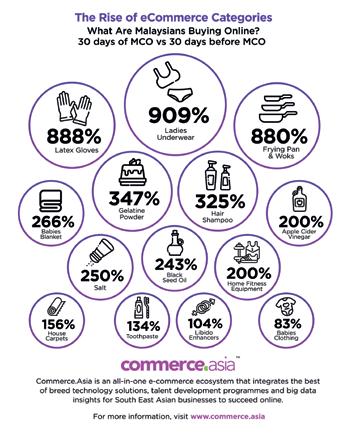
6 minute read
Rise of e-commerce in Malaysia during Covid 19
The Covid-19 pandemic has made online shopping the new norm, thus making the e-commerce business boom globally as people shift their shopping towards online platforms. Malaysia too, has seen a huge increase in online shopping. A study shows what Malaysians shopped online during the lockdown.
uring the lockdown or the D movement control order (MCO) nearly all economic activities in the country had ground to a halt. The only sector that thrived during this period was e-commerce sector. Malaysians turned to online shopping for their needs as there were no shopping malls or shops (except for supermarkets and pharmacies, among others) that were open. Many who had never shopped online started buying things online as well.
Now that the MCO has been lifted, many Malaysians are still wary of being in crowded places and would rather shop online.
THE SURGE IN ONLINE SHOPPING
Commerce.Asia Group of Companies, an e-commerce ecosystem of technology and big data solutions, reports that it saw a surge of 149% yearon-year Gross Merchandise Volume (GMV) growth in the first quarter since the MCO was introduced. According to the company’s founder and executive chairman, Ganesh Kumar Bangah, e-commerce continues to be one of the few industries that would thrive in such challenging circumstances.
The former National Tech Association of Malaysia (PIKOM) Chairman adds that, despite the pandemic, Commerce.Asia ecosystem is seeing a very encouraging spike in this first quarter of the year. “We are seeing significant growth in our merchants’ sales across various product categories. While some were practical purchases of essential items, other purchases were complete surprises to us given that the country is undergoing MCO. This change in buying behaviour shows that Malaysians are adapting to the new living situations.”
He foresees a permanent change in consumer behaviour with many opting to make their purchases via digital marketplaces even after the MCO is lifted.
Even as e-commerce continues to catapult after the implementation of MCO and merchants work tirelessly to keep up with the demand, what were Malaysians really buying online?
Commerce.Asia leveraged its huge database to analyse sales trends (30 days of MCO vs 30 days before MCO) across their merchants. From the graphics, we can discern that the MCO has had a marked effect on the consumers’ purchasing behaviours. With health being a major concern, it was no surprise that latex gloves saw staggering increase in sales as people try to protect themselves from Covid-19.
As expected, essential items such as food, toiletries and baby products surged in sales. What was surprising was that the fastest-growing product transacted during the MCO was ladies undergarment!
IMPORTANCE OF
LOGISTICS
Ordering goods online is one thing, but delivering the goods to the customers on-time is equally important. Ganesh stresses the importance of merchants to be on top of logistics arrangements to ensure on time delivery.
“Logistics play a vital role in supporting e-commerce by ensuring efficient processing and delivery of orders. In addition, logistics and transport services support the supply chain of essentials which ensures continuity of daily supply to consumers,” says
Ganesh.
He adds that the Commerce.
Asia ecosystem has been built with this in mind, which is to give a one stop solution to e-commerce merchants from on board to delivery, which would enable merchants to sell quickly and effectively.
Commerce.Asia comes out as the top e-commerce company in Asia Pacific
Malaysia’s Commerce.Asia has emerged as the Top Winner of the APAC CIO Outlook Awards for being the “Best E-commerce Consulting/ Services Company in APAC 2020” among the selected Top 10 companies in the Asia-Pacific region.
APAC CIO Outlook is an international print magazine published from the hub of technology, Silicon Valley, with the aim of connecting the region’s various Enterprise IT communities.
Ganesh Kumar Bangah, the Founder and Executive Chairman of Commerce.Asia said that he was “humbled to have received such a prestigious international award” and vowed to continue empowering brands and merchants to realise their fullest potential via e-commerce. “We had set ourselves the high bar by being the region’s most reliable outsourced/managed services provider to enable merchants to get a bigger share of increased consumer demand, and to ensure that they have the fulfilment capabilities to cope with increased demand.
“We cover aspects of e-commerce that businesses often have to struggle to learn, including warehousing, payment, delivery, marketing and order management. It’s a commitment to truly remove the stress of working with technology for businesses that may not be so tech savvy,” he added.

He explained that the group’s end-to-end, one-stop solution enables brands and businesses to sell online, while managing all aspects of their online businesses from developing their own online stores to managing product sales across multiple e-marketplaces such as Lazada, Shopee, Lelong, PrestoMall, Amazon and eBay.
WTO report: How the Covid-19 pandemic has affected e-commerce worldwide
The World Trade Organisation business-to-consumer (B2C) sales and • The pandemic highlighted the need (WTO) Secretariat has published a an increase in business-to-business to bridge the digital divide, both within new information note looking at (B2B) eCommerce. The increase in and across countries. Many traditional how the Covid-19 pandemic has B2C sales is evident in online sales of obstacles have been accentuated and affected e-commerce, including medical supplies, household essentials have continued to hamper greater the implications for cross-border and food products. participation in ecommerce activities trade. The WTO Work Programme • Demand also increased for internet by small producers, sellers and defines “electronic commerce” as the and mobile data services. The consumers in developing countries, production, distribution, marketing, network capacity and spectrum to particularly in least-developed sale or delivery of goods and services accommodate the shift to online countries. This has underscored the by electronic means. activities has urgently had to be need for efficient and affordable ICT
It notes the increased use of adapted by both operators and services, such as telecommunication, e-commerce as consumers adapt governments. Demand has fallen, computer and other IT services and to lockdowns and social distancing however, for certain services with emerging technologies. measures and draws attention to a large online component, such as • Governments have adopted new several challenges, such as the need tourism services. measures, and the private sector has to bridge the digital divide within and • Ecommerce for goods and services also acted, to respond to and ensure across countries. trade has been adversely impacted that ecommerce can help to alleviate by the same factors that have caused some of the challenges faced in Some key points from the report disruption in supply and demand combatting the virus. • Enforcement of social distancing, overall. Disruptions resulted in delivery • The pandemic has made it clear lockdowns and other measures in delays or cancellation of orders. Other that ecommerce can be an important response to the Covid-19 pandemic ecommerce-related challenges include tool/solution for consumers. It can has led consumers to ramp up online price hikes, product safety concerns, also support small businesses and, shopping, social media use, internet deceptive practices, cybersecurity by making economies more telephony and teleconferencing, and concerns, the need for increased competitive, be an economic driver streaming of videos and films. bandwidth, and development related for both domestic growth and • This has resulted in spikes in concerns. international trade.









